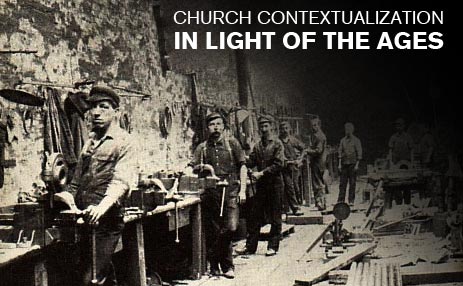Latest
-
Objections to the Christian Faith from the Unchurched and De-Churched
 Tue Dec 02, 2014
Tue Dec 02, 2014
by Resurgence -
Craig Groeschel: We Innovate for Jesus
 Tue Oct 14, 2014
Tue Oct 14, 2014
by Resurgence -
Mark Driscoll: Revelation
 Tue Oct 07, 2014
Tue Oct 07, 2014
by Resurgence -
RESURGENCE LEADERSHIP #034: JOHN PIPER, WHY I TRUST THE SCRIPTURES, PART 2
 Tue Sep 30, 2014
Tue Sep 30, 2014
by Resurgence -
Resurgence Leadership #033: John Piper, Why I Trust the Scriptures, Part 1
 Tue Sep 23, 2014
Tue Sep 23, 2014
by Resurgence

Archives
Church Contextualization In Light Of The Ages: Preface

The Backstory
"I know it's only sociology but I like it, like it, yes I do." Conversations from our past often reenter the present on their own terms. Once easily forgotten, they can come back and be received again as surprisingly valuable. For me, this happened in the fall of 2004 at a training event for church planters in Albany, N.Y. It was a joint training session involving a new church planting movement called Acts 29. I had met its founder, a young pastor from Seattle, two years prior at Spanish River Presbyterian Church in Boca Raton, Fl. He seemed jaded at an early age, leaning arrogantly on his stool with an almost venomous look in his eye. I desperately wanted to dismiss him, but everything he said intrigued me and seemed right, intelligent, and well-considered. At that conference, I had a conversation with Mark, one that seemed no different than most of my conversations at the time. My mind was stuck on ideas about how the world was changing—had changed—and what impact it would have upon the church. It was a conversation I may well have forgotten had I not been sitting recently at an Acts 29 Boot Camp in Raleigh, N.C.
Control Versus Influence
Mark was closing the session, and it was an engaging piece on the nature of movements. In the midst of his talk, he mentioned the concept of control versus influence, and my ears perked up. That is exactly what we had been talking about a half decade ago in Albany. And then, in a gesture of humble attribution, he said he had gotten that nugget from me. I recalled the conversation, but I never would have guessed it would have stayed with Mark all these years. Those ideas have now been developed much more deeply. The external dialogue of understanding has progressed and, thanks to a challenge by Mark that day in 2004, has become part of a church community called Terra Nova in Troy, N.Y. You see, at the end of the boot camp Mark's final words to me were that he enjoyed what I said and thought I was intelligent, but that he wouldn't listen because I was not planting a church. I felt a mix of confusion and anger, but finally it was a piece of confirmation. It was time no longer to talk about ideas but to see if these ideas meant anything to people.
Sociological Gaps Deconstructed
These articles will concentrate on two eras of time, their sociological and cultural symptoms, and what impact they have on the way we view society. They are the Industrial Revolution and the Information Age. Though these two eras remain connected, and one did not become extinct at the presence of the other, there still exists a massive chasm between them. We have lived through one of these eras, which is best described as a great shifting in the tectonic plates of time. People who lived on one side cannot always fully understand those who lived on the other, so immediate is the change in such a vast space. That is why one of my sociological heroes, a Canadian philosopher named Marshall McLuhan, coined the term "Generation Gap." To be born on one side of this gap meant you would not understand or be understood by someone born on the other. That generation referred, of course, to the Baby Boomers. To be continued.